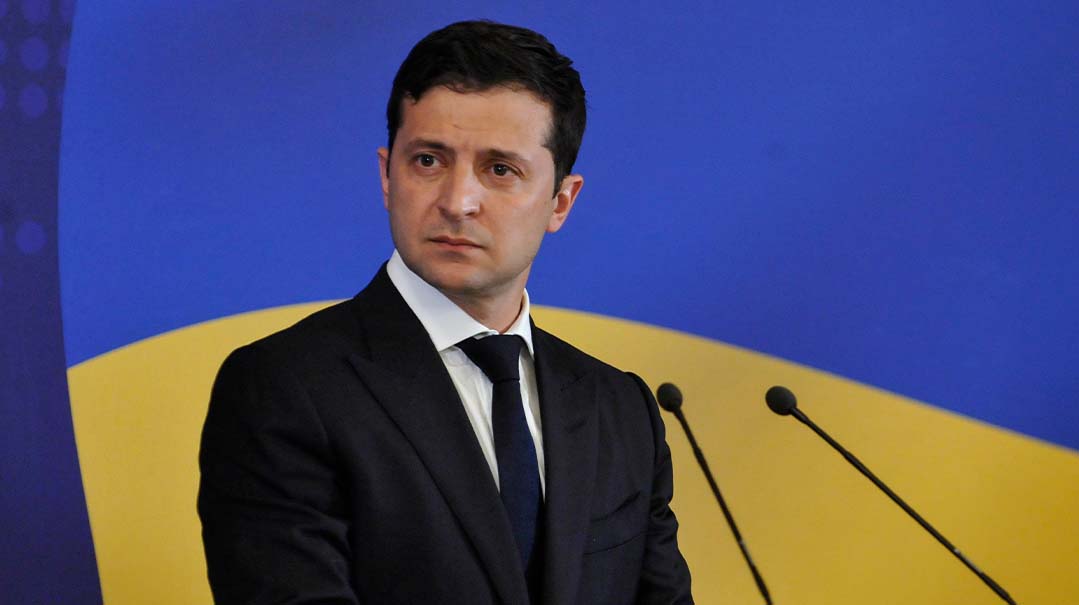Collision Course

In the confrontation between Biden and Putin, the American president can’t afford to be the one who backs down

At this writing, no one can tell whether the explosions reverberating through eastern Ukraine will escalate into full-scale war or the conflict simmering since 2014 will remain limited. But one thing is clear: In the confrontation between Joe Biden and Vladimir Putin, the American president simply can’t afford to be the one who backs down.
Indeed, after the chaotic Afghanistan withdrawal, and with the domestic economy struggling, a foreign policy success to campaign on is simply crucial for Biden. This dynamic has put the two leaders on a collision course.
But there’s a catch for Biden. If you look at the basket of possible sanctions, they include cutting Russia off from the SWIFT international banking system, as well as sanctions on Russian banks and companies. But some voices have warned that kicking Russia out of the international system could cause a chain reaction with a serious impact on many Western companies, including leading American corporations.
Until now, the American response has been limited. The United States has repeatedly called out Russian attempts to manufacture a pretext for an invasion. But it has also tried to neutralize one of Putin’s most critical levers of power by making arrangements with Egypt, Azerbaijan, and other countries to backfill whatever natural gas flows to Europe are cut off by a vindictive Russia, during midwinter. The fear of this was the reason the Europeans, and the Germans in particular, were slow to get involved in the crisis.
Another thing Biden has achieved is, in effect, bringing NATO back to life. In his view, if Ukraine falls, then the Baltic nations are the next in line, which effectively means reigniting the Cold War. But more generally, if the United States can’t stop Russia from swallowing Ukraine, who will stop Putin? From Biden’s perspective, America has to return to its position of world leadership.
“America is back” has been his favorite catchphrase since assuming office. And if you want America to lead the world, you need to breathe new life into NATO and have these countries’ backs economically as well as militarily to expand American influence in Eastern Europe and encourage them to keep their distance from Putin. While no one knows how and when the current crisis will end, it’s already clear that if there’s one thing Biden has succeeded at in weeks of diplomacy, it’s bringing NATO together and presenting a common front.
Not everyone in America shares his ideology. First and foremost, the Republican Party is split between Trump’s “America first” isolationist wing that wants the US to focus on domestic affairs and stop being the policeman of the world, and the Republican establishment, which views the world as being divided between the Soviet bloc and the American bloc, and thinks force is the only language Putin understands.
That said, the more hawkish wing is still in the majority. Last week, for example, a bipartisan initiative to impose new sanctions on Russia failed in the Senate, with 30 (out of 50) Republican Senators demanding much harsher measures than their Democratic colleagues were willing to sign off on. Republicans presented a 98-page bill of their own, spelling out harsh sanctions on Russia, even before an invasion. Democrats fumed, accusing Republicans of partisan posturing. Since then the two parties have managed to put out a bipartisan statement expressing support for Ukraine, a sign that a majority of Congress favors a hard line against Putin.
And where does Israel stand?
Israel has been doing its best to stay out of the conflict between the two nations, albeit with little success so far. Ukrainian officials have expressed disappointment with the tone Israel has taken. Israel’s ambassador to Kiev was even summoned for an official reprimand by the Ukrainian foreign ministry last week. The reason? Israel has refrained from condemning Russian aggression, instead seeking agreement with Moscow to allow Israelis to leave Ukraine in the event of an invasion. Kiev was furious at the report that Israel was coordinating with Russia for the aftermath of an invasion, with the tacit assent this implies.
Still, Jerusalem prefers not to get into a conflict with Putin. Israel needs to stay on good terms with Russia so it can continue aerial attacks on Iranian targets in Syria. But even beyond this, Israel sees Russia as a significant actor in the region, whether it comes to arms sales to neighboring countries, or votes in the UN Security Council; hence the decision to remain a bystander in the conflict and only take measures to evacuate Israeli citizens from the country.
But well before Russian tanks roll into Kiev, the economic fallout of the fiercest confrontation between Russia and the West in decades is already being felt in our wallets. Crude oil WTI prices currently stand at $91.50 per barrel (after briefly reaching $95), a sharp spike from $65 just three months ago.
At gas stations in Washington, D.C., the cheapest gas, 87 octane, is currently priced at $3.50 per gallon, but in many places the price is closing in on $4. The surge in oil prices will impact the cost of transporting goods, which in turn will impact the price of commodities at the supermarket. And again, all this is before Russian tanks encircle Kiev.
The stock market is also plunging, with technology stocks and other speculative assets again paying a price in the past week. Investors are turning to safer assets: gold, raw materials, and bonds, which are on the rise. The combination of rampant inflation, five expected interest rate hikes this year, and the spike in oil prices is an unmitigated economic disaster for Biden in a midterm year.
(Originally featured in Mishpacha, Issue 900)
Oops! We could not locate your form.






